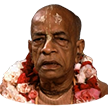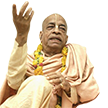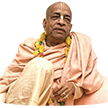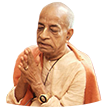Māyāvāda philosophy has created this situation, that "God is impersonal, and, everyone can become God, or everyone is God." This Māyāvāda philosophy has created this havoc. Therefore Caitanya Mahāprabhu has recommended that māyāvādī haya kṛṣṇe aparādhi. "All the Māyāvādīs, they are offenders to Kṛṣṇa." Therefore they cannot make any progress in Kṛṣṇa consciousness. Unless they accept the supreme position of the Lord, they can not advance in their spiritual life.
Srila Prabhupada's books, lectures, conversations and letters offer a comprehensive presentation of this essential subject as seen in the Vaniquotes Mayavada Philosophy category. An introduction from his books is given below in the following 10 quotes.
Quotes from Srila Prabhupada's books

vanipedia.org
|
According to Māyāvāda philosophy, this manifested world, or material world, is mithyā or māyā, false. The Māyāvādī preaching principle is brahma satyaṁ jagan mithyā: "Only the Brahman effulgence is true, and the cosmic manifestation is illusory, or false." But according to Vaiṣṇava philosophy, this cosmic manifestation is true because it is caused by the Supreme Personality of Godhead. In the Bhagavad-gītā the Lord says that He enters within this material world by one of His plenary portions and thus the creation takes place. From the Vedas also we can understand that this asat, or temporary cosmic manifestation, is an emanation from the supreme sat, or fact. (Kṛṣṇa Book, Chapter 87)
|

vanipedia.org
|
The individual soul is a particle from the very beginning. One should not think that because the individual soul is a particle, it is fragmented from the whole spirit. Māyāvāda philosophy enunciates that the whole spirit exists, but a part of it, which is called the jīva, is entrapped by illusion. This philosophy, however, is unacceptable because spirit cannot be divided like a fragment of matter. That part, the jīva, is eternally a part. As long as the Supreme Spirit exists, His part and parcel also exists. As long as the sun exists, the molecules of the sun's rays also exist. (Śrīmad-Bhāgavatam 3.25.17)
|

vanipedia.org
|
Māyāvāda philosophy supports the impersonalist view that Nārāyaṇa, the Supreme Personality of Godhead, has no form. One can imagine impersonal Brahman in any form—as Viṣṇu, Lord Śiva, Vivasvān, Gaṇeśa or Devī Durgā. According to the Māyāvāda philosophy, when one becomes a sannyāsī he is to be considered a moving Nārāyaṇa. Māyāvāda philosophy holds that the real Nārāyaṇa does not move because, being impersonal, He has no legs. Thus according to Māyāvāda philosophy, whoever becomes a sannyāsī declares himself Nārāyaṇa. Foolish people accept such ordinary human beings as the Supreme Personality of Godhead. This is called vivarta-vāda. (Caitanya-caritāmṛta, Madhya-līlā 18.109)
|
Mayavada Philosophy - explore more within this category.
Vanipedia has now over 903 introductory articles compiled from Srila Prabhupada's books under the series titled Essential Subjects. All these articles can be seen in the Table of Content on the right side of this article and also here in this Umbrella Category.
Browse through them to relish the breadth and depth of Srila Prabhupada's teachings - There is a subject for everyone.
| |
|
| |
HOME
Choose Another
Essential Subject
|
| |
|









